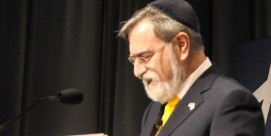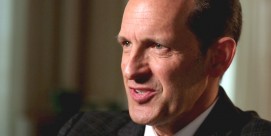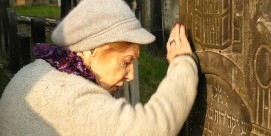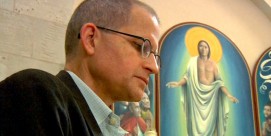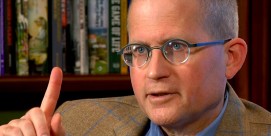In This Episode << SLIDE LEFT TO SEE ADDITIONAL SEGMENTS
Excerpts: On Dietrich Bonhoeffer
From “The Making of a Disciple” by Robert Coles in DIETRICH BONHOEFFER (Modern Spiritual Masters Series, Orbis Books, 1998):
The heart of Bonhoeffer’s spiritual legacy to us is not to be found in his words, his books, but in the way he spent his time on this earth, in his decision to live as if the Lord were a neighbor and friend, a constant source of courage and inspiration, a presence amid travail and joy alike, a reminder of love’s obligations and affirmations and also of death’s decisive meaning (how we die as a measure of how we have lived, of who we are). Bonhoeffer abandoned cleverness with language, brilliance at abstract formulation; he forsook denominational argument, oaths and pledges and avowals. In the end he reached out to all of us who crave, in hunger and in thirst, God’s grace. And, one believes, unwittingly (how can it be otherwise?), unselfconsciously, he became its witness, its recipient. His spiritual gift to us, especially, is his life. The principles he avowed and discussed in his writings gain their authority from the manner in which he conducted that life.
The witness of Dietrich Bonhoeffer, in all its near storybook drama, reminds us that if evil can be, as Hannah Arendt observed, “banal” in its everyday enactment, then good can be surprising in its occurrence, tenacious in its vitality, no matter the overwhelming odds against its survival. In the end, Hitler showed us a “heart of darkness,” beating all too horribly fast, not in the distant jungle but right in our very midst, in our living rooms and our classrooms and, alas, even our churches and seminaries. It is just such a near-at-hand truth that Dietrich Bonhoeffer grasped right away, when others closed their eyes or calculated cravenly their immediate prospects. But he went that one further step; he remembered Jesus not intellectually or theologically or historically, but as our intimate teacher he meant himself to be, the one who holds us to a certain moral and spiritual mark, and won’t let go of us — if, that is, we are truly prepared, at whatever risk, to stay engaged with him, to follow in his footsteps.
From “Dietrich Bonhoeffer” in THE DEATH OF ADAM by Marilynne Robinson (Houghton Mifflin, 1998):
Great theology is always a kind of giant and intricate poetry, like epic or saga. It is written for those who know the tale already, the urgent messages and the dying words, and who attend to its retelling with a special alertness, because the story has a claim on them and they on it. Theology is also close to the spoken voice. It evokes sermon, sacrament, and liturgy, legend and prayer. It earns its authority by winning assent and recognition, in the manner of poetry but with the difference that the assent seems to be to ultimate truth, however oblique or fragmentary the suggestion of it. Theology is written for the small community of those who would think of reading it. So it need not define freighted words like “faith” or “grace” but may instead reveal what they contain. To the degree that it does them any justice, its community of readers will say yes, enjoying the insight as their own and affirming it in that way.
Theology may proceed in the manner of a philosophical treatise or a piece of textual criticism, but it always begins by assuming major terms. And all of them, being imbedded in Scripture and tradition, behave together differently from discursive language. To compound the problem, Christian thinkers since Jesus have valued paradox as if it were resolution. So theology is never finally anything but theology, words about God, proceeding from the assumptions that God exists and that we know about him in a way that allows us to speak about him. Bonhoeffer calls these truths of the church “a word of recognition among friends.” He invokes this language of recognition and identification in attempting to make the church real and aware of itself with all that implied when he wrote. For him, word is act. And, for him, it was. …
The day after the failure of the attempt to assassinate Hitler, in which he and his brother and two of his brothers-in-law were deeply involved, Bonhoeffer wrote a letter to [Eberhard] Bethge about “the profound this-worldliness of Christianity.” He said, “By this-worldliness I mean living unreservedly in life’s duties, problems, successes and failures, experiences and perplexities. In so doing we throw ourselves completely into the arms of God, taking seriously not our own sufferings, but those of God in the world — watching with Christ in Gethsemane. … How can success make us arrogant, or failure lead us astray when we share in God’s suffering through a life of this kind?” These would seem to be words of consolation, from himself as pastor to himself as prisoner. But they are also an argument from the authority of one narrative moment. The painful world must be embraced altogether, because Christ went to Gethsemane. …
Two ideas are essential to Bonhoeffer’s thinking: first, that the sacred can be inferred from the world in the experience of goodness, beauty, and love; and second, that these things, and, more generally, the immanence of God, are a real presence, not a symbol or a foreshadowing. They are fulfillment as well as promise, like the sacrament, or the church. The mystery of the world for Bonhoeffer comes with the belief that immanence is pervasive, no less so where it cannot be discovered. The achieved rescue of creation brings the whole of it under grace. So moments that are manifestly sacred do not judge or shame the indifference of the world, or its misery or its wickedness. Instead, they imply a presence and an embrace sufficient to it all, without distinction. Bonhoeffer is certainly never more orthodox than in seeing the revealed nature of Christ as depending, one might say, on his making precisely this overreaching claim on recalcitrant humankind. …
It is striking how Bonhoeffer insists always on the role of disciple, of one among a company of equals, from which no one must be excluded. Though he was an aristocrat and aloof in his manner, he seems to have had no imagination of beatitude which is not a humanly understandable moment with a beloved friend. To Bethge, he wrote of his imprisonment, “One thing is that I do miss sitting down to table with others. The presents you send me acquire here a sacramental value; they remind me of the times we have sat down to table together. Perhaps the reason why we attach so much importance to sitting down to table together is that table fellowship is one of the realities of the Kingdom of God.”
“Forgiveness Without Words” by Dietrich Bonhoeffer from A YEAR WITH DIETRICH BONHOEFFER (HarperSanFrancisco, 2005):
We may suffer the sins of one another; we do not need to judge. That is grace for Christians. For what sin ever occurs in the community that does not lead Christians to examine themselves and condemn themselves for their own lack of faithfulness in prayer and in intercession, for their lack of service to one another in mutual admonition and comforting, indeed, for their own personal sin and lack of spiritual discipline by which they have harmed themselves, the community and one another? Because each individual’s sin burdens the whole community and indicts it, the community of faith rejoices amid all the pain inflicted on it by the sin of the other and, in spite of the burden placed on it, rejoices in being deemed worthy of bearing with and forgiving sin. … The service of forgiveness is done by one to the other on a daily basis. It occurs without words in intercessory prayer for one another. And all members of the community who do not grow tired of doing this service can depend on the fact that this service is also being offered to them by other Christians. Those who bear with others know that they themselves are being borne. Only in this strength can they themselves bear with others. (From A TESTAMENT TO FREEDOM)

